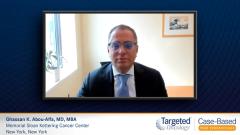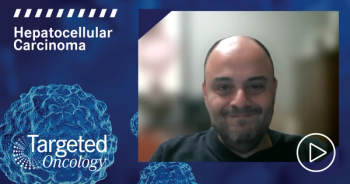
Frontline Treatment Options for Unresectable HCC
An expert in gastrointestinal oncology comments on approaching first-line therapy for a patient with previously untreated, unresectable HCC and reviews key findings from the IMbrave150 trial.
Ghassan K. Abou-Alfa, MD, MBA: One might wonder why they chose lenvatinib. I’d say that it’s an appropriate option. After all, it’s already FDA-approved. This is based on the randomized clinical trial of the inferiority of sorafenib vs lenvatinib. There’s another choice: atezolizumab-bevacizumab. One might wonder why we choose 1 vs the other. Especially because there’s a bit of a drive that many of us have in regard to checkpoint inhibitors. It’s a must. We have 3-plus atezolizumab-bevacizumab. Especially because of the improvement of survival that’s currently measured at 19-plus months.
We have to remember that despite the positive data with atezolizumab-bevacizumab, many details continue to emerge from that study, which is called IMbrave150. Lots of which was at the AACR [American Association for Cancer Research] Annual Meeting not long ago, where the group reported to us for the first time the evaluation of the patients based on the potential for the antidrug antibody that can occur while the patient is being treated with atezolizumab.
As we know, all the patients who receive checkpoint inhibitors can develop anti-drug antibodies to that drug. We cannot tell in advance who might get the antidrug antibody, but patients might develop the anti-drug antibody within 1 to 3 doses of treatment. We know of some drugs that have very limited antidrug antibody potential; for example, durvalumab and pembrolizumab. But on the other hand, atezolizumab stands out.
This was confirmed by the IMbrave150 investigators, who reported at the AACR Annual Meeting that 30% of the patients on the study had antidrug antibody. What does that mean? It appears to me that those patients who were antidrug antibody–negative, who didn’t develop an antidrug antibody against this drug, did great. The hazard ratio was 0.5. That’s way better than we can think of, which is amazing. On the other hand, the 30% of patients who were antidrug antibody–positive, had a hazard ratio of 0.96. In other words, the study compared atezolizumab plus bevacizumab-sorafenib, and it ended up showing that atezolizumab plus bevacizumab in those patients was as good as sorafenib.
One might wonder, do I give all those intravenous therapies, or do I want to reflect on giving only a pill for those patients? This has continued to level off as a field. But there’s no doubt that we can see that physicians as well as patients have different perspectives. Am I a risk taker? Should I really take the therapy and not worry about the potential antidrug antibody? I lose an option, which is first line, because it might not work better than the sorafenib. Maybe I subject myself to potential adverse effects, among which the biggest fear is the bleeding that can occur because of bevacizumab. Because of this, the patient needs an endoscopy. Or shall I play it more safe? There are still effective therapies that can definitely have a benefit.
Transcript edited for clarity.





















